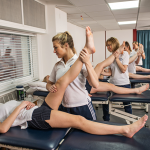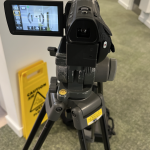 Produced by Guest blogger
Produced by Guest blogger
This is a guest blog post by current student Rebekah Phillips, studying BSc (Hons) Physiotherapy.
 Hello, my name is Rebekah a (now) final year Physiotherapy student at Bournemouth University. I started University like the majority of students, I moved away from home and settled in Student Accommodation where I quickly learnt to fend for myself and pluck up some courage to make new friends. Physiotherapy at University already connected me with like-minded people, with a small cohort of around 30 we bonded quickly and looked out for each other during stressful exam periods and cheered each other on during full-time placements.
Hello, my name is Rebekah a (now) final year Physiotherapy student at Bournemouth University. I started University like the majority of students, I moved away from home and settled in Student Accommodation where I quickly learnt to fend for myself and pluck up some courage to make new friends. Physiotherapy at University already connected me with like-minded people, with a small cohort of around 30 we bonded quickly and looked out for each other during stressful exam periods and cheered each other on during full-time placements.
Before COVID-19, the course involved both theory and practical work with two six-week placements in clinical settings such as hospitals in the second and final year (typically one placement in year one). I have always enjoyed learning through practice and getting a taste of different areas of Physiotherapy through my placements, in the past I have worked in the community, an orthopaedic ward and elderly/neurological clinic.
The last 6 months of my studies, however, has been a whole new challenge; the set curriculum was flipped on its head and we had to be adaptive to changes in examinations becoming virtual and the looming uncertainty if we’d get any physical physiotherapy practice before the year finished. I, like many other healthcare students felt in an awkward middle ground – I was confident enough to help on the frontline, maybe part of that came from feeling young and invincible but mainly that I knew I had a duty of care. However, we were only second years and typically we needed to be guided and monitored by an educator during Placement.
My Placement and Treating COVID-Positive Patients
With the hard work of staff at BU and Health Education England (plus lots of emails to hospitals), I was  lucky enough to secure a role as a Therapy Assistant in a Neurological Rehabilitation Unit with my lecturers supporting me virtually to reflect and learn on my experience during the pandemic. It was a stab in the dark to start as I was miles from Bournemouth, and I was anxious to see how much healthcare had changed to treat and prevent the spread of COVID. Thankfully I settled quickly with a great multidisciplinary team on the ward and continual virtual mental support from BU.
lucky enough to secure a role as a Therapy Assistant in a Neurological Rehabilitation Unit with my lecturers supporting me virtually to reflect and learn on my experience during the pandemic. It was a stab in the dark to start as I was miles from Bournemouth, and I was anxious to see how much healthcare had changed to treat and prevent the spread of COVID. Thankfully I settled quickly with a great multidisciplinary team on the ward and continual virtual mental support from BU.
In this ward, I was treating both COVID-positive and negative patients, with Neurological illnesses such as Post-Stroke, rare conditions like Miller Fisher Syndrome, Delirium and elderly fallers.
The 6-weeks I worked on the ward was a blessing and a nightmare at the same time. I quickly noticed how the Therapy team was the centre of patient wellbeing on the ward, restrictions on visitors to the hospitals and keeping patients in their rooms has a detrimental impact on patient mental health and wellbeing. Patients were understandably lonely, bored and frustrated with the new restrictions therefore, therapy sessions offered many patients time to offload their stresses and work hard on their physical health which research shows has a positive impact on mental health.
Whether it was learning to walk following a Stroke or simply doing chair exercises and chatting about their life’s patients we grateful for my company and I equally enjoyed theirs. Building rapport with your patients, as I have learnt throughout my degree, not only makes therapy easier and effective. I found so much joy in offering time to patients yet, this joy hid a lot of upset as I stood where their loving relatives wish they could. With COVID Positive patients this was harder. As I stood covered head to toe in protective gear, a rapport was harder to build, when I saw myself in the mirror I looked like a robot and I imagine I provoked fear in some patients, being something out of a horror film. Over time I found ways to connect the best I could such as touching their hand, telling them a little bit about myself, relating to one of their interests and showing them a picture of my face without PPE on. I learnt so much about Physiotherapy and Mental Health that I will carry with me for the rest of my career. Physiotherapy holds so much beauty, it proves to people that their own strength and belief powers healing, and in my bias opinion there is no better skill than this.
If you are entering a Healthcare course this year or in the future, I offer this advice to you, always put your mental and physical health first, during these tough times the hospital team looks out for each other but it is good to learn how you de-stress and escape on your own. It took me time to find what works but I use yoga and meditate when I’ve been through a tough time on Placement. Remember you have to help yourself before you can help others. If this sounds like a lot it is okay, everything is a learning curve when you are a student and Bournemouth University and the Physiotherapy lecturers have been exceptional in supporting me through this journey I could not fault them. A problem shared is a problem halved.
The Future
I am so grateful to have this experience under my belt, I saw COVID-19 first-hand and can already picture the ripple-effect it will continue to have on our healthcare service. It is therefore vital for all Physiotherapy students to re-enter our Placements in any way possible as we can support our NHS alongside becoming even better future physiotherapists.
If you’re interested in becoming a physiotherapist or have any questions I am available on Unibuddy, a messaging service by the University. Just find Bournemouth University Physiotherapy course page and my face will pop up, or click here.
Rebekah.
 My frontline experience as a physiotherapy student
My frontline experience as a physiotherapy student Adult nursing student Kayleigh highlights the positives among the negative press
Adult nursing student Kayleigh highlights the positives among the negative press My eye-opening nursing elective in Zambia
My eye-opening nursing elective in Zambia My social work placement leads to a job offer
My social work placement leads to a job offer








